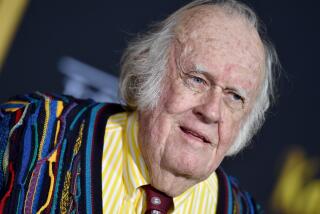A Common Thread
- Share via
Sitting barefoot and cross-legged on a couch in his tidy office at UC Irvine, psychiatry professor Roger Walsh looks to be gearing up more for a yoga class than an interview.
Walsh, 53, published his first nonacademic book this year. “Essential Spirituality” has already sold about 10,000 copies.
The book was a culmination of 20 years of Walsh’s in-depth study of major religions. His goal was to identify practices--not dogma--that all the faiths hold in common.
With an introduction by the Dalai Lama, Walsh’s book offers steps for living ethically and cultivating emotional and spiritual wisdom based on explorations of Buddhism, Christianity, Hinduism, Islam, Judaism, Confucianism and Taoism.
Walsh said he thought writing “Essential Spirituality” would take three months. But it took more than three years, and he went through five editors at John Wiley & Sons, his New York publisher, in the process of trying to strike the right tone for his foray into the mainstream.
“It was a humbling experience to write for a popular audience,” said Walsh, who has published numerous academic books. “In academia, your obtuseness is a sign of your profundity.”
*
A native Australian, Walsh holds a doctorate in neuroscience and a doctor of medicine, both from the University of Queensland, Australia. He also did a residency in psychiatry at Stanford University. He teaches at UCI’s medical school and in the departments of anthropology and philosophy. He also leads a weekly meditation group for UCI medical students.
Practicing what he preaches, the former agnostic strives to be fully in each moment.
“I want to teach practices that transform, heal and awaken people,” he said.
Marj Britt, senior minister at Unity Church of Tustin, has recruited Walsh on occasion to speak to her congregation about meditation and spirituality. “I am fascinated by the way Roger walks his spiritual path in the world,” she said.
“Here’s a medical doctor and a psychiatrist who is a dedicated practitioner of meditation,” said Britt, who considers Walsh’s embrace of reason and faith to be very unusual.
“We so often get caught up in the trappings and dramas of success,” she said. “But Roger hasn’t lost track of who he is. He exemplifies humility and kindness.”
*
Walsh said his goal is to convey to the larger culture the importance of slowing down and enjoying the present in a frenetic world.
When he was a child in the Australian Outback, science was his god. Because the scientific world is predicated on reason and not faith, Walsh said, he came to spirituality later in life.
Not until he was studying for his psychiatry residency did he decide to give the practices of meditation and prayer a whirl. It changed his life.
“I felt like I’d been living on 6 inches of the wave in an ocean I didn’t even know existed,” said Walsh, who does not affiliate with any religion but instead celebrates rituals and practices from many.
A sign on his door says “Mindful” in large red block letters, and a Buddha carved of wood anchors one corner of his office. A tiny Zen garden, complete with a bubbling fountain, sits near his desk.
*
Walsh wants to find ways to take the routines of daily life and transform them into sacred rituals. For example, he has a small wooden “door harp” on the back of his office door that chimes as he goes in or out.
He said he is astounded by similarities among religions and that Americans today have a unique opportunity to practice and explore faiths without ending up on a funeral pyre or a crucifix.
“We can practice religions now without risk to our lives,” he said. “What was heresy or apostasy before can now be explored without fear.”
His next project is a grant proposal to study love and wisdom, two “supreme virtues” touted in all religions.
“I just want to get out into the culture that love is an art, not something you’re a victim of,” he said.


